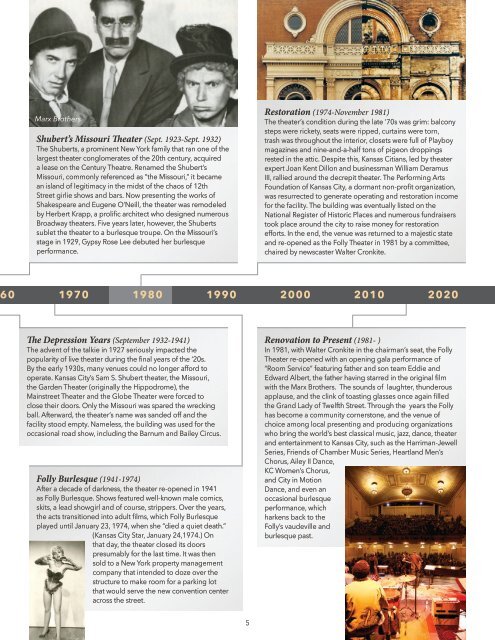You also want an ePaper? Increase the reach of your titles
YUMPU automatically turns print PDFs into web optimized ePapers that Google loves.
Marx Bro<strong>the</strong>rs<br />
Shubert’s Missouri <strong>Theater</strong> (Sept. 1923-Sept. 1932)<br />
The Shuberts, a prominent New York family that ran one of <strong>the</strong><br />
largest <strong>the</strong>ater conglomerates of <strong>the</strong> 20th century, acquired<br />
a lease on <strong>the</strong> Century Theatre. Renamed <strong>the</strong> Shubert’s<br />
Missouri, commonly referenced as “<strong>the</strong> Missouri,” it became<br />
an island of legitimacy in <strong>the</strong> midst of <strong>the</strong> chaos of 12th<br />
Street girlie shows and bars. Now presenting <strong>the</strong> works of<br />
Shakespeare and Eugene O’Neill, <strong>the</strong> <strong>the</strong>ater was remodeled<br />
by Herbert Krapp, a prolific architect who designed numerous<br />
Broadway <strong>the</strong>aters. Five years later, however, <strong>the</strong> Shuberts<br />
sublet <strong>the</strong> <strong>the</strong>ater <strong>to</strong> a burlesque troupe. On <strong>the</strong> Missouri’s<br />
stage in 1929, Gypsy Rose Lee debuted her burlesque<br />
performance.<br />
Res<strong>to</strong>ration (1974-November 1981)<br />
The <strong>the</strong>ater’s condition during <strong>the</strong> late ‘70s was grim: balcony<br />
steps were rickety, seats were ripped, curtains were <strong>to</strong>rn,<br />
trash was throughout <strong>the</strong> interior, closets were full of Playboy<br />
magazines and nine-and-a-half <strong>to</strong>ns of pigeon droppings<br />
rested in <strong>the</strong> attic. Despite this, Kansas Citians, led by <strong>the</strong>ater<br />
expert Joan Kent Dillon and businessman William Deramus<br />
III, rallied around <strong>the</strong> decrepit <strong>the</strong>ater. The Performing Arts<br />
Foundation of Kansas City, a dormant non-profit organization,<br />
was resurrected <strong>to</strong> generate operating and res<strong>to</strong>ration income<br />
for <strong>the</strong> facility. The building was eventually listed on <strong>the</strong><br />
National Register of His<strong>to</strong>ric Places and numerous fundraisers<br />
<strong>to</strong>ok place around <strong>the</strong> city <strong>to</strong> raise money for res<strong>to</strong>ration<br />
efforts. In <strong>the</strong> end, <strong>the</strong> venue was returned <strong>to</strong> a majestic state<br />
and re-opened as <strong>the</strong> <strong>Folly</strong> <strong>Theater</strong> in 1981 by a committee,<br />
chaired by newscaster Walter Cronkite.<br />
60 1970 1980 1990 2000 2010 2020<br />
The Depression Years (September 1932-1941)<br />
The advent of <strong>the</strong> talkie in 1927 seriously impacted <strong>the</strong><br />
popularity of live <strong>the</strong>ater during <strong>the</strong> final years of <strong>the</strong> ‘20s.<br />
By <strong>the</strong> early 1930s, many venues could no longer afford <strong>to</strong><br />
operate. Kansas City’s Sam S. Shubert <strong>the</strong>ater, <strong>the</strong> Missouri,<br />
<strong>the</strong> Garden <strong>Theater</strong> (originally <strong>the</strong> Hippodrome), <strong>the</strong><br />
Mainstreet <strong>Theater</strong> and <strong>the</strong> Globe <strong>Theater</strong> were forced <strong>to</strong><br />
close <strong>the</strong>ir doors. Only <strong>the</strong> Missouri was spared <strong>the</strong> wrecking<br />
ball. Afterward, <strong>the</strong> <strong>the</strong>ater’s name was sanded off and <strong>the</strong><br />
facility s<strong>to</strong>od empty. Nameless, <strong>the</strong> building was used for <strong>the</strong><br />
occasional road show, including <strong>the</strong> Barnum and Bailey Circus.<br />
<strong>Folly</strong> Burlesque (1941-1974)<br />
After a decade of darkness, <strong>the</strong> <strong>the</strong>ater re-opened in 1941<br />
as <strong>Folly</strong> Burlesque. Shows featured well-known male comics,<br />
skits, a lead showgirl and of course, strippers. Over <strong>the</strong> years,<br />
<strong>the</strong> acts transitioned in<strong>to</strong> adult films, which <strong>Folly</strong> Burlesque<br />
played until January 23, 1974, when she “died a quiet death.”<br />
(Kansas City Star, January 24,1974.) On<br />
that day, <strong>the</strong> <strong>the</strong>ater closed its doors<br />
presumably for <strong>the</strong> last time. It was <strong>the</strong>n<br />
sold <strong>to</strong> a New York property management<br />
company that intended <strong>to</strong> doze over <strong>the</strong><br />
structure <strong>to</strong> make room for a parking lot<br />
that would serve <strong>the</strong> new convention center<br />
across <strong>the</strong> street.<br />
Renovation <strong>to</strong> Present (1981- )<br />
In 1981, with Walter Cronkite in <strong>the</strong> chairman’s seat, <strong>the</strong> <strong>Folly</strong><br />
<strong>Theater</strong> re-opened with an opening gala performance of<br />
“Room Service” featuring fa<strong>the</strong>r and son team Eddie and<br />
Edward Albert, <strong>the</strong> fa<strong>the</strong>r having starred in <strong>the</strong> original film<br />
with <strong>the</strong> Marx Bro<strong>the</strong>rs. The sounds of laughter, thunderous<br />
applause, and <strong>the</strong> clink of <strong>to</strong>asting glasses once again filled<br />
<strong>the</strong> Grand Lady of Twelfth Street. Through <strong>the</strong> years <strong>the</strong> <strong>Folly</strong><br />
has become a community corners<strong>to</strong>ne, and <strong>the</strong> venue of<br />
choice among local presenting and producing organizations<br />
who bring <strong>the</strong> world’s best classical music, jazz, dance, <strong>the</strong>ater<br />
and entertainment <strong>to</strong> Kansas City, such as <strong>the</strong> Harriman-Jewell<br />
Series, Friends of Chamber Music Series, Heartland Men’s<br />
Chorus, Ailey II Dance,<br />
KC Women’s Chorus,<br />
and City in Motion<br />
Dance, and even an<br />
occasional burlesque<br />
performance, which<br />
harkens back <strong>to</strong> <strong>the</strong><br />
<strong>Folly</strong>’s vaudeville and<br />
burlesque past.<br />
5




